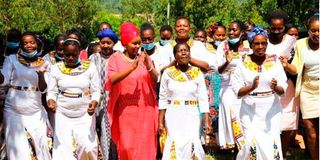Let widows have financial independence

Anita Nyawira Mbae, an aspirant for Tharaka-Nithi Woman Rep seat, with Muungano Widows Group in Marimanti ward,Tharaka Constituency, on January 11, 2022.
What you need to know:
- In many communities, women are often left in poverty when their husband dies.
- They are disinherited, abused and evicted from their land and home.
According to the United Nations, enabling widows to sustain both themselves and their families entails eliminating social stigma that foster exclusion and encourage harmful or discriminatory behaviours.
In many communities, women are often left in poverty when their husband dies. They are disinherited, abused and evicted from their land and home. Their children are equally affected, withdrawn from school and, especially girls, exposed to various forms of abuse. These cases continue to take root, where widows have to fight with their husband’s family to inherit property and land.
Along the Lake Victoria region, widows are often accused of killing their husbands, stigmatised and forced into wife inheritance with the notion of continuing the family lineage of their kin. All these atrocities thrive due to poverty.
June 23 was International Widows Day. This year’s event had the theme “Sustainable solutions for widows’ financial independence”. It seeks to advocate the empowerment and education of widows to become financially capable, thus reducing and ending the cycle of violence within the population.
Ensuring widows have access to information, specifically about access to productive resources, fair employment and income—including inheritance, land, pensions and social protections not based solely on marital status—remains critical to the realisation of local and global development goals, including Sustainable Development Goals (SDGs).
Highlighting their issues
We should discourage categorisation of widows as invisible women with invisible problems. Our efforts must aim at showcasing how their capabilities and highlighting their issues to policymakers.
Every International Widows Day is proposed to encourage action in achieving full rights for widows, highlighting the need for funding and investing in research and statistics into violence against widows, discrimination and poverty suffered by them. That will, in turn, support the development of policies and programmes that effectively respond to the specific needs of widows and accelerate the recent UN adoption during the Commission of Status of Women (CW66) on protection of widows’ human rights globally.
The government should make efforts in ensuring the Ministry of Public Service, Youth and Gender Affairs develops policies and seeks resources to empower widows and allow them access to education, healthcare and life free of violence and abuse.
We should not only prioritise and remember widows on June 23, but endeavour to have them as key stakeholders and partners all through development change. Together, we can enable widows and their children to create a life for themselves following the death of their husband and (father) as a key intervention to ending the cycle of violence and abuse against them.
Ms Odhiambo is the Communications Associate at Nyanam International. [email protected].





